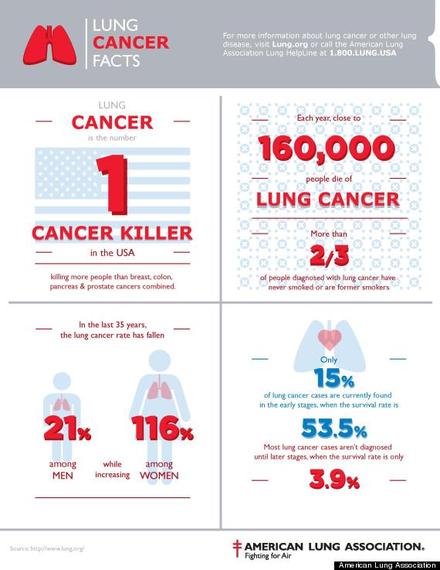This November, we recognize Lung Cancer Awareness Month across our nation. When people think of lung cancer, they may not immediately think of a specific color or image, but most Americans do know someone whose life has been touched by lung cancer. There are approximately 399,000 Americans living with lung cancer and it's a disease that does not discriminate. The face of lung cancer could be your mother's, your brother's, your best friend's or even your son or daughter's. The face of lung cancer could be that of a man or woman, nonsmoker or smoker. It could even be yours.
During my tenure with the Lung Association I have had the distinct pleasure of meeting inspiring people who have lived and are still living with lung cancer or who wholly support loved ones with the disease. I am inspired by Denise Hogan, coordinator of our POW'R Against Tobacco coalition and a longtime employee of the Lung Association, who is a three-year lung cancer survivor. I am inspired by Peter DeAngelis, a 34-year-old lung cancer patient, who actively supports the Lung Association. I am inspired by our volunteer board members and their unwavering support of our mission. I am inspired by our volunteers and advocates who climb skyscrapers and cycle hundreds of miles in memory of loved ones lost to lung cancer.
The American Lung Association is committed to combating lung cancer, a disease responsible for more deaths than any other cancer. In fact, lung cancer claims more lives each year than breast, colon and prostate cancer -- combined. It is also true that lung cancer carries an unjust stigma, a stigma that the Lung Association is working hard to eliminate. We believe that no one deserves lung cancer and no one deserves to die from it.
While most everyone knows that smoking is a cause of lung cancer, you may not know that more than two-thirds of lung cancer diagnoses occur in former or never smokers. There are various other risk factors: radon gas, secondhand smoke, air pollution and other environmental factors, and genetics. Lung cancer is not just a smoker's disease.
We at the American Lung Association believe it is most important to focus on how to prevent lung cancer, how to diagnose it earlier, how to treat the disease and to eventually find a cure. If you are a smoker, quitting is the first step to dramatically reduce your risk of lung cancer. The American Lung Association recognizes that quitting is a daunting task. Some fear it may be impossible. The average smoker is only successful in quitting after multiple failed attempts. Our Quitter In You online resource is specifically designed to support smokers each step of the way, no matter how many times it takes to stick.
The hard truth is that lung cancer is most often diagnosed in the late stages and carries a five-year survival rate of just 16 percent. Lung cancer screening has seen a lot of media attention as of late. That is because new studies have shown that low-dose CT screening for high-risk individuals can reduce mortality by 14 to 20 percent. The United States Preventive Services Task Force (USPSTF) has proposed recommendations that high risk individuals be screened for lung cancer each year. The earlier lung cancer is diagnosed, the greater the chance of successful treatment. You can find out if you or someone you love is considered high risk for lung cancer and a candidate for CT screening at LungCancerScreeningSavesLives.org.
The American Lung Association funds several research studies on lung cancer through our annual Awards and Grants Program. In the Northeast, research is being conducted in top universities and research facilities in both Boston and New York. Still, lung cancer research urgently needs more funding. Our government is simply not doing enough to take on the leading cancer killer of Americans.
A diagnosis of lung cancer is overwhelming and can bring up an array of different emotions and countless questions. The American Lung Association provides support from the moment of diagnosis. "Facing Lung Cancer: Support from Day One" is an online interactive resource for patients and their loved ones. The website offers all the information you need, from what the first steps are following a diagnosis to an interactive library featuring medical professionals and real people who have been where you are now.
The American Lung Association is "Fighting for Air." Each individual that joins the fight is helping us carry out our mission to save lives by improving lung health and preventing lung disease through research, education and advocacy. Lawmakers at the local, state and federal level need to hear from you -- their constituents and the very same people they have been elected to serve.
Visit LungNE.org to get involved - make a donation, register for a local fundraising event, or become an e-advocate. From spreading the word about the lung diseases that affect more than 33 million Americans, to sharing your story, to making a contribution so that we can one day eradicate lung disease, your support makes a difference in the Fight for Air.
I am confident that if the medical community, research community, business community, elected officials, patients, advocates, and family members all come together -- we could dedicate the necessary resources to combat this deadly disease.
---
Have a question about lung cancer or any other lung disease? The American Lung Association runs a valuable resource for questions on lung health. Our Lung HelpLine, staffed by experienced registered nurses, registered respiratory therapists and certified cessation counselors, is available seven days a week at 800-LUNG-USA.
